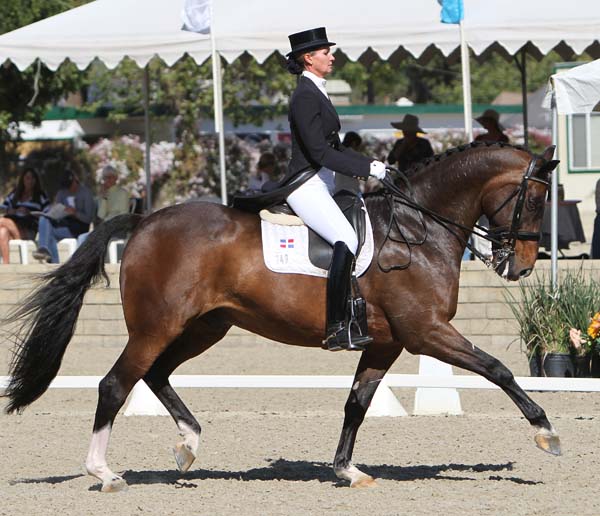Controversial 3 Home Judge Rule for non-European Events Ends Jan. 1
13 years ago StraightArrow Comments Off on Controversial 3 Home Judge Rule for non-European Events Ends Jan. 1

By KENNETH J. BRADDICK
The policy that allowed CDI3* events outside Europe to use a majority of three home country judges and led to a legal challenge over London Olympic selection procedures in South America will officially end on Jan. 1, 2013.
National federations would be informed by the International Equestrian Federation “that no more exceptions for three home judges at CDIs3* would be granted,” the FEI said in response to questions from dressage-news.com. Approval of dressage competitions for 2013 will be made on Oct. 1.
Brazilian rider Luíza Tavares de Almeida became the sole rider from South America at the Olympics after qualifying atop the standings for the region based on results that were attained primarily at events in which three of the five judges were Brazilian. She competed in London on Pastor, one of two horses she rode in qualifying events.
A legal challenge by the Dominican Republic on behalf of Yvonne Losos de Muñiz who placed second in the rankings after competing only in competitions with a minimum of three foreign judges in Florida and California was rejected in July by the Court of Arbitration for Sport based in Lausanne, Switzerland.
Eduardo Muñiz, the husband of Yvonne and active in Dominican Republic horse sports, said of the decision: “It’s quite surprising to see the FEI backtracking now by discontinuing the controversial exemption they fought so hard for in CAS and their own tribunal. I would assume if it was so fair and favorable for promoting the sport they should have included it in the permanent dressage rules.
“This change clearly shows, in my opinion, that the exemption was unfair and unjustified, especially for Olympic qualification.”
Controversy arose over applying for the 2012 Olympics the policy that was introduced in 2010 in an effort to increase participation at the World Equestrian Games in Kentucky. That memo stated:
”Memo: Ground Juries at CDIs3* and below outside Europe for 2010:
“For 2010 following dispensation may be granted based on application from the relevant NF (national federation):
“For CDI3* and below outside Europe, NOT championships
” – Big tour to be judged by 5 judges as today, but an option to use three judges from host nation, instead of two as it is in the rules.
” – Small tour, incl. YR, J and P can be judged by three judges (at least two foreign).
“Please address your applications to the FEI Dressage Department in connection with submitting your Draft Schedule or earlier.”
Qualification as an individual for the Olympics in London was based on the eight best results for a horse and rider combination at CDI3* or higher for the year to Mar. 1, 2012. No South American nation was able to field a team at the Games.

In response to the initial appeal by the Dominican Republic over the exceptions, the FEI Tribunal stated that Australia, Canada, New Zealand and the United States had requested “exceptions” to the three-foreign-judge rule for competitions and the FEI had approved every request.
However, the Tribunal made no distinction between small tour and big tour, though only big tour Grand Prix counted for Olympic qualifying.
A dressage-news.com review of the FEI database found that 51 CDI3* or higher rated competitions were held outside Europe during the Olympic qualifying period from Mar. 1, 2011 to Mar. 1, 2012, and they were in Australia, Brazil, Canada, Japan, New Zealand and the United States.
The FEI database of Grand Prix, Olympic/Grand Prix Special and Grand Prix Freestyle showed:
Australia–Nine events in which seven had three foreign judges at Grand Prix levels, one event with four foreign judges and one with three foreign judges for Grand Prix and the Freestyle and two for the Special.
Brazil–13 events, 10 with three Brazilian and two foreign judges, three with four foreign and one Brazilian judge.
Canada–Four events, one of which had seven judges, including four foreign, two with three foreign judges and a fourth with three foreign judges in the Grand Prix, four in the Special and two in the Freestyle.
Japan–Two events, each with three foreign judges and two Japanese judges.
New Zealand–Two events at which both employed two foreign judges and three New Zealand judges in all Grand Prix classes.
United States–21 events with four employing four foreign judges and 17 with a minimum of three foreign judges.
Exceptions are permitted in extenuating circumstances.
For example, at a World Cup event in Saugerties, New York, the weekend of Sept. 14-16 a foreign judge was involved in an accident and unable to be on the ground jury for the Grand Prix Special. The only available judge was an American that meant the panel of five members included three home judges.

